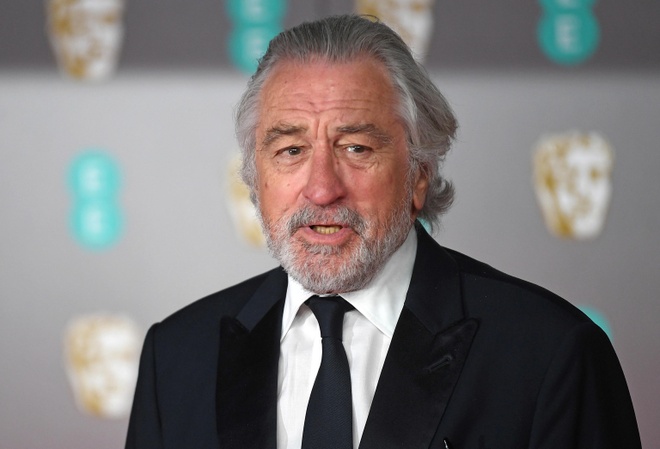The Battle Between Caroline Levit and Hollywood Legend Robert Dairo: A Defamation Lawsuit That Shook the Nation
In an unexpected turn of events, a televised political clash between Caroline Levit, the youngest White House press secretary in history, and Hollywood icon Robert Dairo has led to a monumental defamation lawsuit, one that would eventually become a landmark case, shaking both the media and Hollywood industries.
What began as a simple exchange of words on national television would snowball into a legal battle of unprecedented proportions, forever altering the course of these two powerful figures’ careers.
The Catalyst: The Spotlight Show
The drama unfolded on The Spotlight, a popular political talk show where figures from all sides of the political spectrum came to discuss current events.
The tension was palpable as Caroline Levit, a loyal representative of the Trump administration, sat across from Dairo, a staunch liberal, known for his vocal criticism of conservative politicians. It was here, on this stage, that their fates would collide, igniting a media storm.

The showdown between Levit and Dairo was anything but cordial. When asked about her role in the Trump administration, Levit confidently defended President Trump’s “America First” agenda, describing the liberal media as a “propaganda machine.”
Dairo, ever the provocateur, took aim at Levit, calling her a “puppet” and a “threat to democracy,” attacking her youth, inexperience, and alignment with Trump’s policies. The tension escalated quickly, with audience members split between supporting Levit and Dairo, creating an electric atmosphere that would resonate far beyond that evening.
The Infamous Words That Led to Court
What seemed like just another heated exchange on national television quickly took a darker turn. Dairo’s comments, especially the accusation that Levit was a “puppet” and a “threat to democracy,” sparked outrage.
The next day, the political and social media landscape was flooded with reactions. Levit’s supporters praised her for holding her ground, while Dairo’s fans continued to defend him, calling Levit’s response too dismissive.
But for Levit, this was not just a media spectacle—it was a personal attack that would have far-reaching consequences. She knew that Dairo’s words were not just damaging her personally, but also misrepresenting an entire political movement.

Rather than retaliating on social media or getting caught in endless online debates, Levit took a more calculated approach: she turned to the law.
A Legal Battle Begins
Levit’s legal team, led by Sylvia Martinez, a seasoned lawyer known for turning legal cases into political statements, decided to pursue a defamation lawsuit against Dairo.
With mounting evidence, including a leaked email from Dairo’s manager suggesting that Dairo target Levit for attention, they filed an $800 million lawsuit. This was not just about personal revenge; Levit was fighting to protect her reputation, and by extension, the integrity of the conservative movement.
The evidence was damning. Video footage from the Spotlight interview, along with a subsequent interview where Dairo called Levit “more dangerous than Trump,” became central to the case. Further investigations into Dairo’s statements revealed a coordinated smear campaign, intended not only to attack Levit personally but also to damage her professional standing.

Dairo’s Downfall
As the lawsuit progressed, it became clear that Dairo’s defense would struggle against the weight of the evidence. His claim that his words were simply political opinions protected under free speech quickly crumbled.
The turning point came when a disgruntled staff member leaked an internal email from Dairo’s team, which revealed that his attacks on Levit were not spontaneous but strategically planned to boost his own anti-Trump image.
With each piece of evidence, Dairo’s defense grew weaker. The internal video, showing Dairo instructing his team to target Levit, further sealed his fate.
In court, Dairo faltered under cross-examination, and his claim of free speech lost all credibility when faced with the deliberate nature of his actions.
The courtroom buzzed with disbelief as Levit’s legal team delivered their final blow. Sylvia Martinez’s closing argument was simple but powerful: “This isn’t just about personal defamation; this is about standing up to a system where the powerful can smear anyone without consequences.” The judge, hearing the evidence and seeing the gravity of the situation, ruled in favor of Levit.

A Cultural Shift
The $800 million judgment against Dairo was a wake-up call to the entertainment industry. No longer could Hollywood stars use their platform to slander political figures with impunity.
The case not only ended in a significant financial loss for Dairo but also sent shockwaves through the media, showing that power does not guarantee immunity from the law.
The impact of Levit’s victory rippled beyond the courtroom. Her legal triumph was celebrated by conservative circles, who hailed her as a new kind of political icon.
Young women and conservatives began to look up to her as a symbol of strength, courage, and resilience. She had turned a defamation lawsuit into a powerful political statement.
The Legacy of Caroline Levit
Levit’s victory in the courtroom did more than just silence Dairo. It set a precedent for holding influential figures accountable for their words, regardless of their celebrity status.
Her success not only reshaped the way public figures communicate but also provided a blueprint for future defamation lawsuits in the age of social media.
As Levit continues to serve as White House press secretary, her legacy grows, not just as a politician, but as a trailblazer for a new generation of leaders who refuse to let their reputations be destroyed by the powerful elite. In an era where words carry weight, Caroline Levit showed that standing up for what you believe in, no matter how young or controversial, can change the course of history.
For those watching from the sidelines, Levit’s legal battle serves as a reminder that in today’s polarized world, the fight for truth and accountability is more important than ever.



